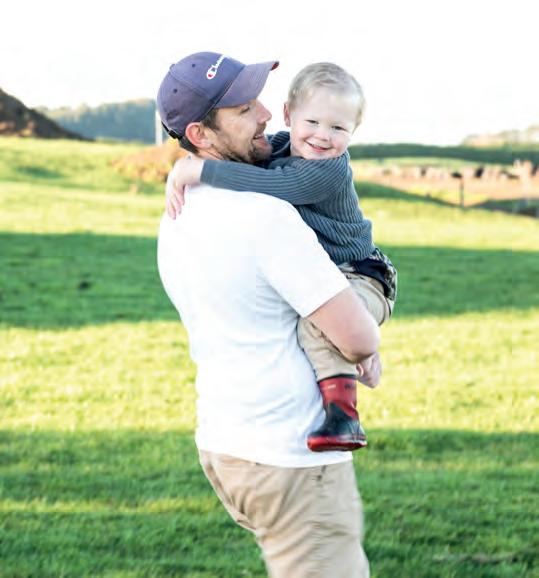
13 minute read
Special Feature – Getting physical for heart and head
GETTING PHYSICAL FOR HEART AND HEAD
GETTING PHYSICAL FOR HEART AND HEAD
As awareness has grown of the stresses farmers face, a network of groups has sprung up dedicated to supporting rural mental health. Need help? All you need do is ask.
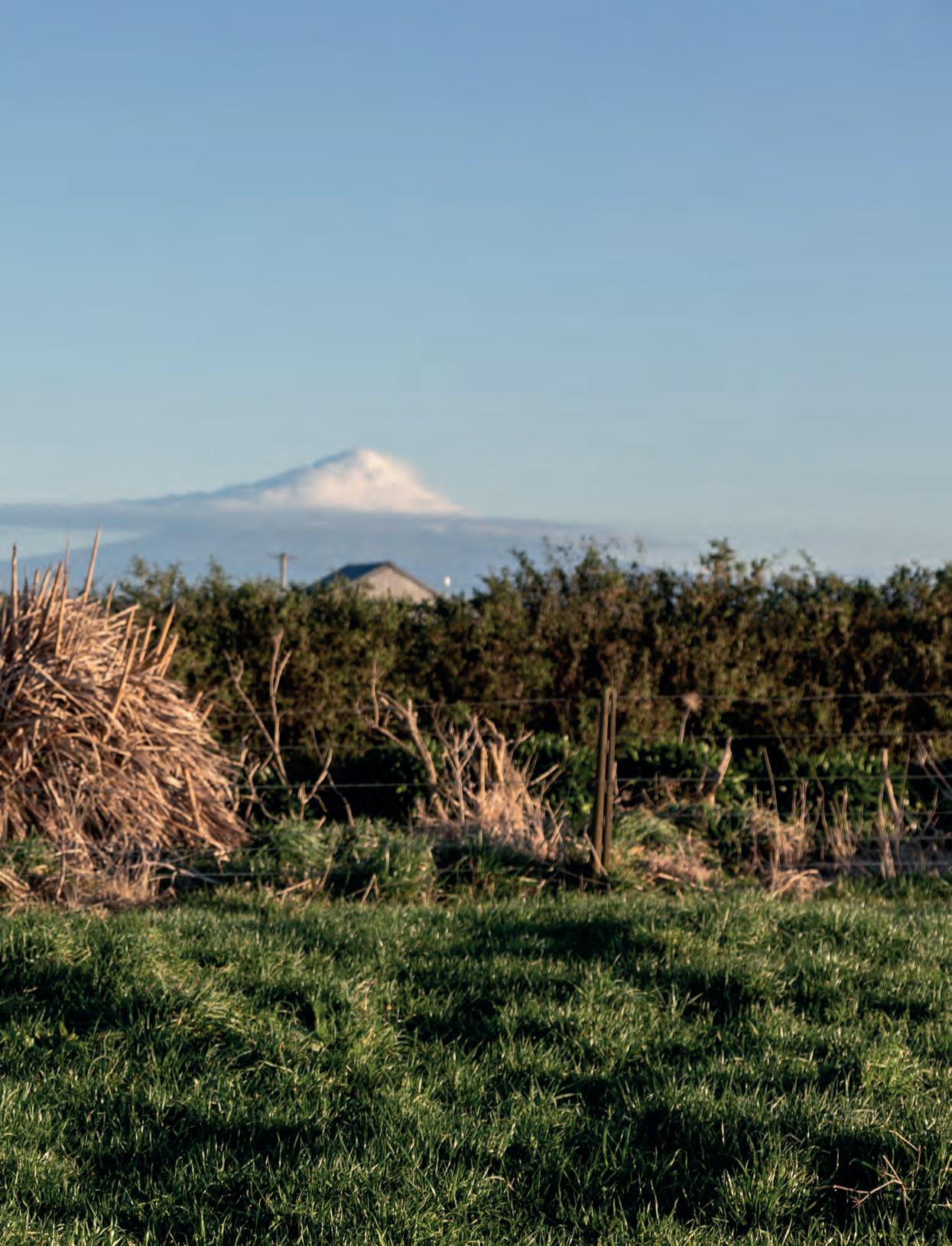
When Farmlands shareholders Donovan Croot and Sophie Cookson saw a post on their local Facebook page canvassing interest in organised fitness sessions, they thought they would give it a crack. At their dairy farm in Manutahi, south Taranaki, they were living with all the financial stresses and workload strains that come with farming. Here was something that might relieve that mental stress and maintain their fitness for the physical demands of working the land.
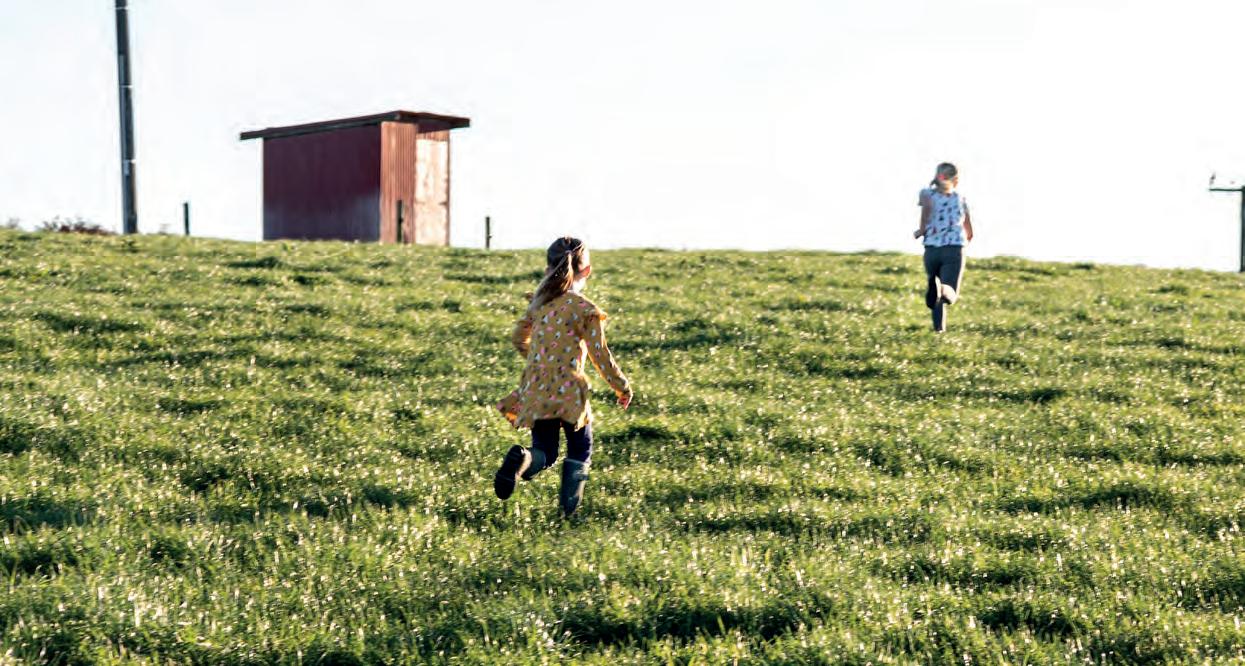
| Donovan and Sophie have found the Farm Fit sessions a boon. Kane Brisco, the man behind the post, was already a convert to the power of exercise to help with the pressures of farming. He and wife Nicole had been through some tough times on their dairy farm in nearby Ōhāngai, what with the financial pressure of a falling milk pay-out, a young family and all the stresses that farming brings. Kane was finding the relief that exercise brought him was an important part of his week. He was looking after himself better too. Kane reasoned that what was good for him was probably good for others too so hence the post, which went viral in a South Taranaki kind of way. Soon Kane found himself at the helm of a new business, Farm Fit, running two training sessions a week on his farm, using traditional bootcamp and body weight exercises alongside some gear he built out in the paddock. The hour-long sessions are a mix of strongman stuff such as flipping tyres and swinging sledgehammers, and classic farmers’ movements such as lifting and carrying. “I gear it to that typical stuff that farmers do. Whether they are farmers or not, people enjoy it. I push their boundaries, make it fun. It’s real-world stuff – everyone needs to be able to pick something up off the ground and carry it,” Kane says. For Donovan, the sessions have been a boon. He reckons his physical fitness and mental health have improved 10-fold since he started going along. Everyone comes away from a session feeling better than before. “The rural setting is just perfect as it doesn’t feel like a gym, which could be quite overwhelming for people who live isolated,” Donovan says. Since the 1980s, when Rural Support trusts were formed to support the farming, cropping and horticulture communities
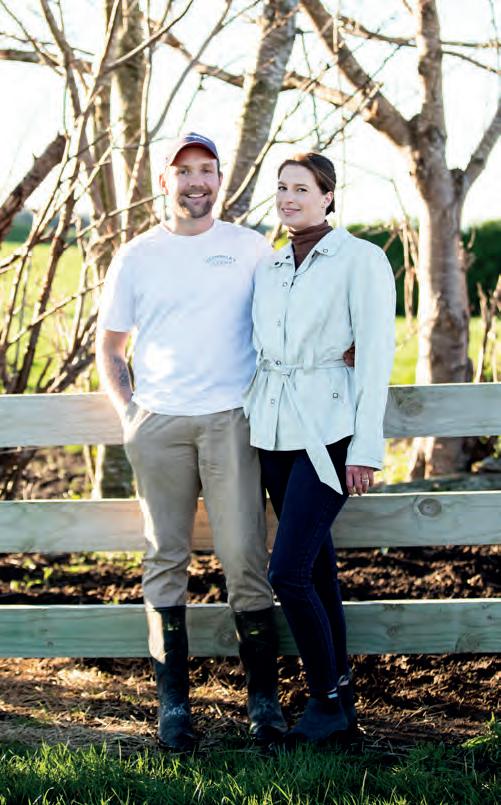
during the financial upheavals of that decade, a network of groups dedicated to supporting rural mental health has formed. These range from nationwide campaigns sponsored by industry groups such as Federated Farmers to local efforts often led by women’s groups within that community. Alongside that, growing awareness of the importance of supporting people’s mental health has spawned public campaigns such as Like Minds, Like Mine and initiatives such as John Kirwan’s depression.org. Gordon Hudson, formerly the rural coordinator at Like Minds Taranaki, is passionate about improving rural mental health. He believes it to be a much bigger issue than it used to be. Why? Because of the changes the industry has gone through. “Farming successfully these days means constantly focusing on your next goal, dealing with increasingly complex technical and compliance issues, keeping on top of equity and cashflow and thinking a generation ahead to make sure that your succession planning is in place,” he says. He sees farmers struggling with business and personal issues but unwilling to talk about them. They fear the stigma associated with mental illness, partly because of the conservative nature of the communities he works in (“most farm owners are over 50”), and partly because of the ‘glass bowl’ effect in isolated rural areas. Just how much of a problem is this? Starting in 2010-11, male and female dairy farmers were interviewed over 3 consecutive years at dairy events across New Zealand. The interviews formed part of the 4-year Dairy Farmer Wellness and Wellbeing Programme. Funded by farmer levies through DairyNZ and by the Ministry for Primary Industries, this programme focused on physical and emotional wellbeing, including reducing stress and fatigue and building networks to support dairy farmers to improve their health. The interviewers found that the prevalence of depression among dairy farmers was slightly lower than national data, while the prevalence of a mood or anxiety disorder was higher. Significantly, 20 percent of respondents were identified with “unacceptable scores associated with depression and/or anxiety” and were followed up. The project found that farming was associated with a unique set of characteristics and stressors. The physical environment, the structure of farming families, economic difficulties and uncertainties combine to make farming potentially hazardous to mental health. In a 2014 review of research, ACC analyst Alison Goffin found farmers identified finances and work as two of their most common worries. Financial worries included irregular and uncertain income and debt, the effects of new government regulations and compliance with these, bureaucracy and paperwork. Work worries included the amount of it, time pressures, long hours especially during peak times such as
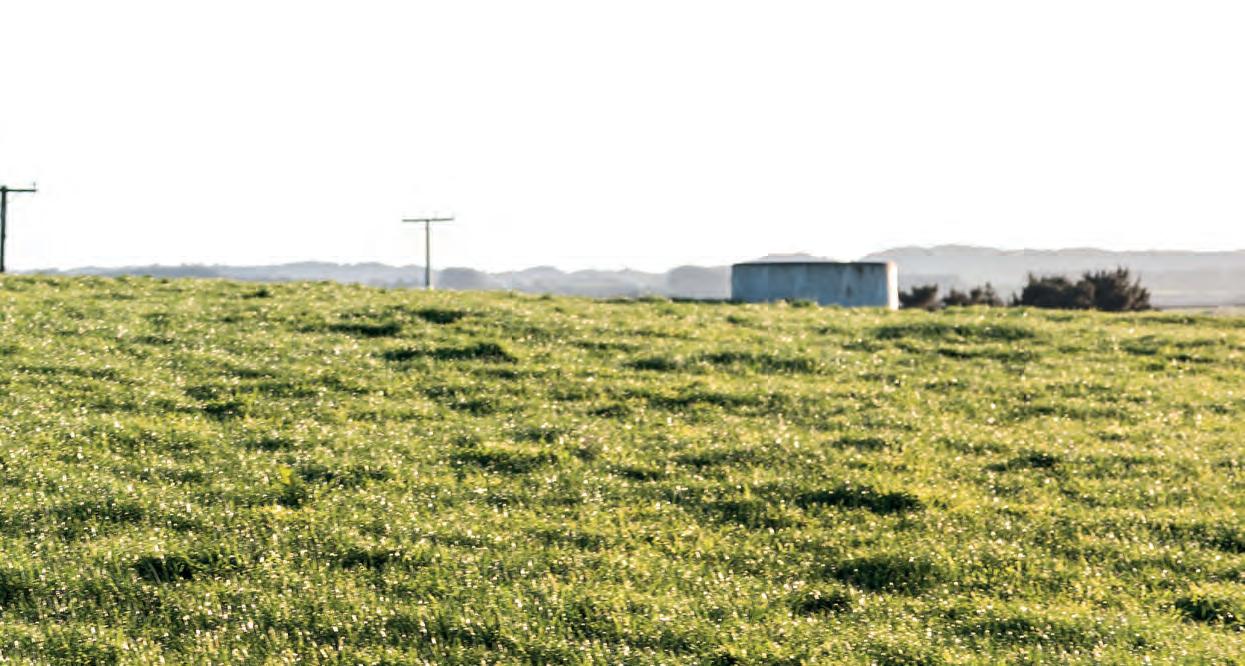
harvesting or calving, difficulties with new technology and working alone. Most commonly, the worry manifested as sleep problems, feeling irritable and down, fatigue and high rates of stress. Mental health problems such as anxiety, depression and psychological distress were identified as risk factors for individual farmers. Background attitudes that limited a person’s ability to acknowledge or express mental health problems and seek help were identified as significant risk factors for suicide in farmers. So it’s physically and mentally tough work often done remotely and alone with all the uncertainty and stress of having the weather as a business partner. In the face of all this, it seems the Kiwi farmer has shown remarkable endurance. If only they would talk about it. Remember the 20 percent the interviewers found were at risk of depression or anxiety? The same research found that in 2012-13, 58 percent of the respondents said they did not talk to anybody about feeling emotionally unwell during the past year; 87 percent said they did not talk to a health professional. Gerard Vaughan, manager at Farmstrong, says the stigma around farmers needing to be tough has caused many to ignore signs of depression and wait years before doing anything about their mental health. That’s why Farmstrong and other such organisations want to normalise the conversation around rural mental health. Kane’s Farm Fit is much more than the bootcamp sessions. Within a few weeks of kicking things off and in response to the strong level of interest, he and Nicole set up a Facebook page for Farm Fit. The page now has over 6,500 followers, many of whom are keen to share their tips and tricks for physical and mental fitness and how they balance work and life. For spring, Kane has posted a programme pitched specifically at farmers to help them get fit for the season. “We thought if we can inspire a few more people around the country that’s got to be a good thing. It’s evolved from there,” Kane says. That evolution includes taking Farm Fit on the road to young farmers in Palmerston North for sessions sponsored by MPI. Kane knows he has helped others both in person and online, both mentally and physically. “We’ve had some pretty heartfelt messages come through over the years and you can see it in people’s faces when they finish a session and then have a good yarn.” It’s all about growing connections. Part of the reason Kane set up Farm Fit is because Ōhāngai no longer has a local hall or
Kane Brisco, Farm Fit

| Kane Brisco set up some training gear in a paddock for his Farm Fit sessions.

local school, with the latter closing in 2012. That means “all these amazing people out here” don’t get together as a community anymore because there is no focal point. Kane says rural communities have changed a lot in the last 20 years, with distractions such as Netflix adding to the isolation forces. “We need people to understand how important that connection with neighbours and the local district is.” If there’s a greater willingness among younger rural people to reach out for support then it’s an echo of a wider trend, with a younger generation much more likely to share their mental health woes than bear them in silence. Where the pub banter might consist mainly of rugby and racing with a bit of weather thrown in, online communities offer isolated rural people scope to share their ups and downs with people who know and understand. For Donovan it’s about “more of the good mahi” already being done to promote wellbeing in rural areas. Communities can help themselves by “getting amongst it”, he says. For Kane, the hard part is “finding that one person in the community willing to sacrifice a bit of their time for the betterment of others”. “Everything takes a leader. There’s a desire but no one wants to put their hand up to do all the work required behind it. That’s the challenge, finding that one person in the community willing to sacrifice a bit of their time for the betterment of others.”
FOR SEPTEMBER'S CALENDAR
1st NZ Random Acts of Kindness Day 10th World Suicide Prevention Day 27th Mental Health Awareness Week begins
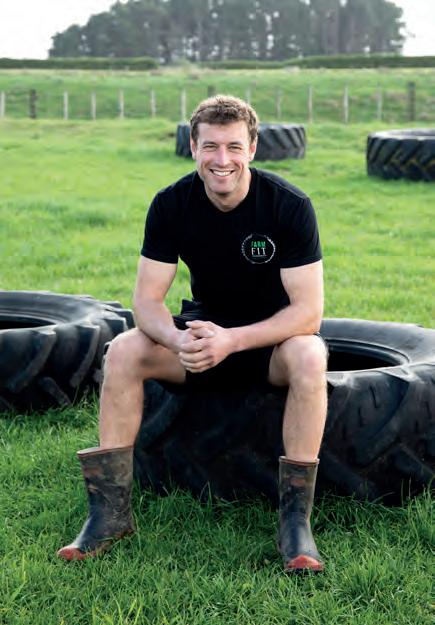
IF YOU NEED HELP
• 1737, Need to talk? Free call or text 1737 to talk to a trained counsellor.
• Anxiety New Zealand 0800 ANXIETY (0800 269 4389) • Depression.org.nz 0800 111 757 or text 4202 • Kidsline 0800 54 37 54 for people up to 18 years old. • Lifeline 0800 543 354
• Mental Health Foundation 09 623 4812
• Rural Support Trust 0800 787 254 • Samaritans 0800 726 666
• Suicide Crisis Helpline 0508 828 865 (0508 TAUTOKO) • thelowdown.co.nz Web chat, email chat or free text 5626
Teams stand ready to help with wellbeing
Controlling what you can control is a common theme in discussions around mental wellbeing. Farming is full of “uncontrollables” that make each day a challenge. These organisations are here to help you focus on what you can control and take steps towards your and your family’s wellbeing.

Farmstrong
Farmstrong is a nationwide wellbeing programme for the rural community. Founded by the Mental Health Foundation and insurer FMG, Farmstrong aims to give back to communities by travelling directly to rural New Zealand to share practical information and tools based on the latest wellbeing science. Your wellbeing can increase or decrease depending on what you do and how you think. Increasing wellbeing builds resilience to face the many pressures involved in farming. Being more resilient allows you to recover quickly from setbacks and to use these as opportunities for learning and growth. Farmstrong provides resources for improving your wellbeing across topics such as sleep, exercise, nutrition, stress and healthy thinking. Experts from doctors to clinical psychologists are available for farmer-focused help, including men’s health checks and injury prevention. Farmstrong runs events where farmers can learn more about wellbeing and support communities with rural media coverage, educational content delivered across multimedia platforms and rural initiatives designed to help farmers connect and get off-farm.
www.farmstrong.co.nz
Stay Well NZ
The Stay Well NZ Charitable Trust was formed in 2017 to provide free, fast and friendly health checks for rural people. Stay Well attends agricultural events, offering health checks and a contact list of experts if extra assistance is required. “The most important animal on any farm is the farmer,” Stay Well says. Staying healthy can be easier said than done,
especially with the intense physical work that farming requires. Stay Well checks aim to support farmers in recognising the signs of declining mental or physical health. Stay Well is present at rural events around the country so pop into the tent to get your blood pressure, cholesterol and skin checked by the team. Early detection can be the key to successful treatment, so make sure you get checked before something small becomes a bigger problem.
www.staywellnz.com
GoodYarn
GoodYarn is an evidence-based, peer-delivered mental health literacy programme for the workplace – both rural and urban. GoodYarn has three key aims and evaluation indicators:
• Increase awareness of signs and symptoms of common mental illnesses.
• Build confidence in starting a conversation where you are concerned. • Improve knowledge of where and how to get help.
Having the confidence to have conversations around mental health with your staff is an important part of running a business and GoodYarn is designed as a practical starting point for businesses and organisations wanting to address mental health and wellbeing. Businesses nominate people within their organisation who have the right skills and attributes to become GoodYarn facilitators. Facilitators are trained up over an intensive 2 days. Once their organisation has become “licensed” to deliver the programme, the facilitators are provided with all the necessary resources to deliver their learnings in the workplace.
www.goodyarn.org
Rural Support Trusts
The Rural Support Trusts (RSTs) were originally formed to support the farming, cropping and horticulture communities during the financial pinch of the 1980s, or after a severe weather event.
The trusts know that living and working rurally can be a challenge. Sometimes things can get a bit too much. RSTs cover all aspects of rural agribusiness such as dry stock, dairy, cropping, horticulture, forestry, poultry and rural contracting. They support all rural people — owners, managers, staff and contractors. The trusts are available to help with chats, guidance and referrals if more than a cup of tea and a yarn is needed. Trusts can connect farmers with professionals who can provide further support across farming or business advice, financial information, health, mental health and counselling services. If a natural disaster occurs, such as a storm or flood, your local Rural Support Trust will be on-hand to help, working with Civil Defence, government and emergency services on behalf of rural communities.
If you’re facing any other challenges or feeling financial pressure, the trusts have the resources and connections to give you a hand.
www.rural-support.org.nz
Depression.org
Depression is a common mental health issue and is like cancer or a heart condition — it is serious and chronic and often goes untreated. But unlike those physical diseases, depression often carries a social stigma. Depression.org believes that research, early intervention, education and better access to care in all communities are key to better mental health. The team at Depression.org includes university researchers, therapists and clinicians, scientists and other specialised experts. They are dedicated to providing access to new research and treatments to educate and support people around the world. Genetics, the environment, psychology and biochemistry all factor into depression. Whether you suffer yourself or it’s a family member, close friend or co-worker, Depression.org has resources available to help inform and educate about major depressive disorders.
www.depression.org/
